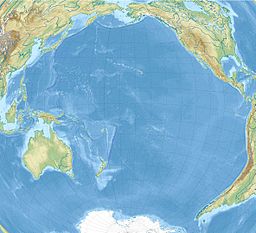Remove ads
Hālaliʻi Lake is an ephemeral lake in the south central region of the island of Niʻihau.[2] During the rainy seasons, it becomes the largest lake in the Hawaiian Islands.[3] It is located near the smaller Halulu Lake, regarded as the largest (non-intermittent) natural lake in the Hawaiian Islands.[4][5]
| Hālaliʻi Lake | |
|---|---|
 Topographic map of Halalii Lake | |
| Location | Niʻihau |
| Coordinates | 21°51′18″N 160°11′10″W |
| Catchment area | 840.7 acres (340.2 ha) |
| Basin countries | United States |
| Surface area | 840.7 acres (340.2 ha) |
| Surface elevation | 9.8 ft (3 m) [1] |
The lake measures around 840.7 acres (340.2 ha) during the rainy seasons. During dry periods on the arid island, the lake transforms into a dry reddish flat punctuated by small saline lakes.[3][4] Other sources states that it has an area of 860 acres (350 ha).[6] Sometimes it is not regarded as a lake due to the irregularity of the water level.[7]
According to Hawaiian linguists Mary Kawena Pukui, Samuel H. Elbert, and Esther T. Mookini, the lake and the surrounding land division was named after its owner, either the Hawaiian high chief (aliʻi) or the Oʻahu trickster god Hālaliʻi.[8][9] Hālaliʻi and Halulu were both aliʻi of the island of Niʻihau.[9] A cinder cone of Haleakalā on the island of Maui also shares the same name.[8]
The Makaloa sedge (Cyperus laevigatus) grows along its shore and was traditionally used by the Native Hawaiians for weaving the Makaloa mats.[3] The lake bed was also used for the cultivation of sugarcane where famously it grew "in the sand with only leaves protruding".[8]
The lake provides natural wetland habitats for Hawaiian bird species including the ʻalae keʻokeʻo (Hawaiian coot), aeʻo (Hawaiian stilt) and koloa maoli (Hawaiian duck).[10][11] The lake is also used for mullet farming. Hawaiians bring the baby pua mullets from the sea in barrels, release them during the rainy seasons and then catch the grown fish when the water recedes in the summer.[7] In Halulu Lake, the fish naturally enter the lake from the sea through lava tubes when they are young.[7] The grown fish are often sold at market on Kauaʻi and Oʻahu.[7]
Remove ads
Remove ads
Wikiwand in your browser!
Seamless Wikipedia browsing. On steroids.
Every time you click a link to Wikipedia, Wiktionary or Wikiquote in your browser's search results, it will show the modern Wikiwand interface.
Wikiwand extension is a five stars, simple, with minimum permission required to keep your browsing private, safe and transparent.
Remove ads

